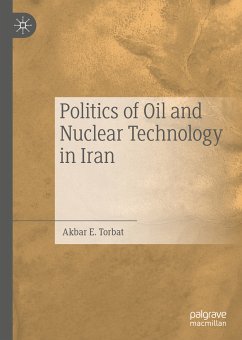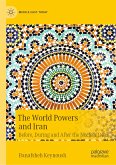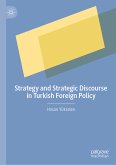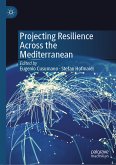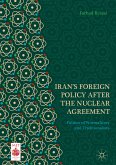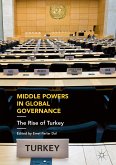'The Politics of Oil and Nuclear Technology in Iran is an excellent work of scholarship. This study uses the framework of center-periphery relations to analyze the political economy of Iranian foreign relations over the course of several decades. It covers a wide range of issues and activities- energy, nuclear weapons, diplomacy, and sanctions - over an impressive period. The arguments about Western engagement with Iran are convincing and the research is first-rate. This book is essential reading for those interested in Iran in particular and the political economy of security issues in general.' - Patrick James, Dornsife Dean's Professor, School of International Relations, University of Southern California, USA
'Akbar Torbat's carefully wrought, highly readable book does two important things: First, it describes Iran's 70-year encounter with the United States as an expansive and controlling world power, highlighting oil politics in the early years and nuclear politics in the later years. Second, it vindicates a center-periphery model of dominance, accommodation and resistance in global relations.' - Nicholas Onuf, Professor Emeritus, Department of Politics & International Relations, Florida International University, Miami, USA
This book focuses on oil politics and the development of nuclear technology in Iran, providing a broader historical context to understand Iran's foreign relations and nuclear policy. The author assesses Iran's encounters with the West in light of major confrontations both in terms of open conflict as well as controversies surrounding treaties with foreign powers. In seeking to understand the geopolitics of oil in direct parallel to the geopolitics of nuclear technology, the book concentrates on Iran's struggles to nationalize its oil, neo-colonialism, the formation of the oil consortium, and the more recent US backtracking onthe nuclear deal with Iran.
Akbar E. Torbat is Adjunct Professor of Economics at California State University, Los Angeles. USA. He has also taught at the University of California - Los Angeles and the University of Southern California. He has written many scholarly articles, and his articles have been published in academic journals such as The Middle East Journal and The World Economy. He has been frequently interviewed by various media outlets regarding foreign policy issues.
'Akbar Torbat's carefully wrought, highly readable book does two important things: First, it describes Iran's 70-year encounter with the United States as an expansive and controlling world power, highlighting oil politics in the early years and nuclear politics in the later years. Second, it vindicates a center-periphery model of dominance, accommodation and resistance in global relations.' - Nicholas Onuf, Professor Emeritus, Department of Politics & International Relations, Florida International University, Miami, USA
This book focuses on oil politics and the development of nuclear technology in Iran, providing a broader historical context to understand Iran's foreign relations and nuclear policy. The author assesses Iran's encounters with the West in light of major confrontations both in terms of open conflict as well as controversies surrounding treaties with foreign powers. In seeking to understand the geopolitics of oil in direct parallel to the geopolitics of nuclear technology, the book concentrates on Iran's struggles to nationalize its oil, neo-colonialism, the formation of the oil consortium, and the more recent US backtracking onthe nuclear deal with Iran.
Akbar E. Torbat is Adjunct Professor of Economics at California State University, Los Angeles. USA. He has also taught at the University of California - Los Angeles and the University of Southern California. He has written many scholarly articles, and his articles have been published in academic journals such as The Middle East Journal and The World Economy. He has been frequently interviewed by various media outlets regarding foreign policy issues.
Dieser Download kann aus rechtlichen Gründen nur mit Rechnungsadresse in A, B, BG, CY, CZ, D, DK, EW, E, FIN, F, GR, HR, H, IRL, I, LT, L, LR, M, NL, PL, P, R, S, SLO, SK ausgeliefert werden.

